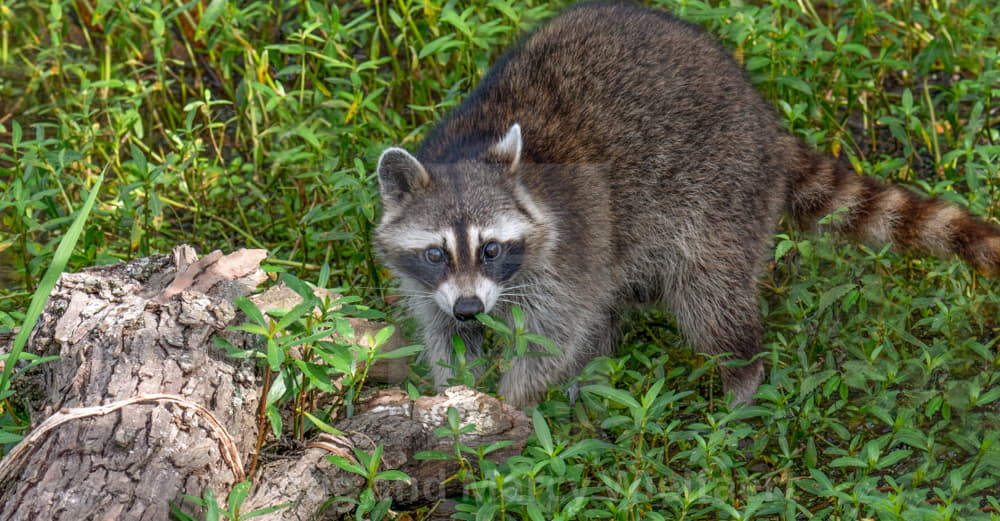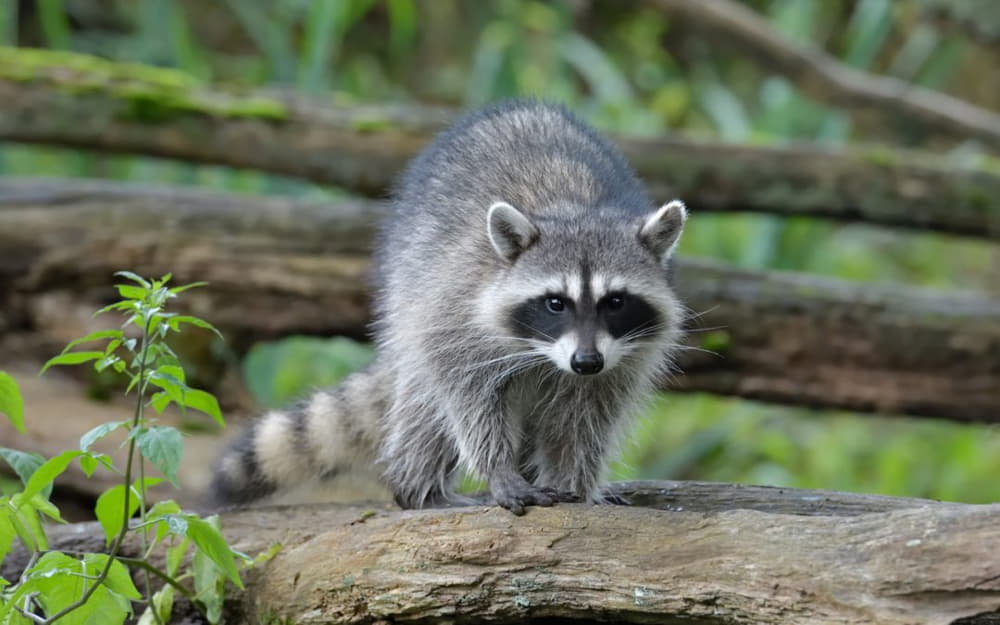Can you hunt raccoons at night? Hunting raccoons at night introduces a unique and challenging dimension to the pursuit of these elusive creatures. Raccoons are primarily nocturnal, and their activity peaks during the darkness, making nighttime hunting an effective strategy. However, whether you can hunt raccoons at night varies from state to state.
Regulations surrounding nighttime raccoon hunting vary by location. It often requires specific permits or adherence to seasonal restrictions. Hunters need to use specialized equipment, such as night vision scopes or thermal imaging devices, to track and locate prey in low light conditions. And the use of these suitable devices is also included in the local laws.
Besides the regulations, hunters enjoy nighttime raccoons hunting at night because they are extremely intelligent and cunning. This makes victories more valuable than ever. Whatever your level of skill, one thing is certain: raccoons hunting at night can be a thrilling and gratifying experience.
Table of Contents
Can You Hunt Raccoons At Night?
The answer to the question of whether or not you can hunt raccoons at night varies depending on each state’s regulations. Some states allow it, while others have strict regulations or outright bans on nighttime raccoon hunting.
The Legality Of Hunting Raccoons At Night
Some states in the US that allow hunting of raccoons at night include: Florida, Georgia, Illinois, Indiana, Iowa, Kansas, Kentucky, Michigan, New Jersey, North Carolina, Ohio, South Carolina, Tennessee, Texas, and Virginia.
In these states, hunters are typically required to obtain a hunting license and follow specific regulations for nighttime hunting. These regulations include restrictions on the use of artificial lights or specific types of weapons.
In addition, there are states that allow raccoons hunting at night, but still have strict regulations to ensure the safety of both hunters and residents. For example, in California, hunters must obtain a special permit to hunt raccoons at night, and they are only allowed to do so during raccoon hunting season. Hunters must follow specific guidelines for using artificial lights and are required to wear reflective clothing.

Other states, such as Colorado and New Mexico, allow nighttime raccoon hunting but only on private land with the landowner’s permission. In contrast, prominent states that prohibit hunting raccoons at night include: Alaska, Hawaii, Idaho, Maine, Montana, New York, North Dakota, Oregon, Washington, Wyoming, etc. Hunters may face sanctions such as fines or civil penalties for intentional violations.
Reasons Behind Nighttime Raccoon Hunting Regulations
Local governments enacted these laws for two primary reasons: to assure hunter safety and to protect animals. Raccoons are known to be scavengers and will often feed on the carcasses of other animals. By limiting the time when raccoons can be hunted, it helps prevent them from consuming animals that may have been killed by hunters during the day.
Hunting at night can be dangerous, especially if artificial lights are used. This makes it difficult for hunters to identify their target accurately and may lead to accidental shootings. Additionally, hunting at night also poses a danger to non-hunters who may be out in the woods during this time.
Read this post: How To Hunt Raccoons At Night Without Dogs
How To Hunt Raccoons At Night
The best time of night to hunt raccoons is usually late at night when they are more likely to move around in search of food. Let’s explore the following detailed guide to best equip yourself for your upcoming hunting trip.
Preparing for Your Night Hunt
Preparation stages include selecting equipment, choosing a hunting location, and tracking raccoons.
Necessary Gear And Equipment
When it comes to hunting raccoon at night, having the right gear and equipment is crucial.
- Weapon: The most common weapon used for hunting raccoons is a .22 caliber rifle. However, shotguns and crossbows can also be effective.
- Night Hunting Lights: A good quality flashlight with a strong beam is a must-have, unless you possess the gift of night vision. Cree LED powered headlamps of today are lightweight, powerful, and energy efficient is a good ideal. It not only helps you navigate through the darkness but also aids in spotting raccoons from a distance.
- Reflective Gear: Wearing reflective gear, such as a vest or hat, can help other hunters see you in low-light conditions. It’s especially crucial if you’re hunting in an area where there may be other hunters present.
- Boot Waders: A good pair of rubber high boots or boots with integrated waders is required. Your waterproof hunting waders will keep your feet dry while crossing bogs, creeks, and brier patches.
- Navigation Tools: When hunting at night, it’s easy to get disoriented in the darkness. Make sure to bring a GPS device or map and compass to help you navigate your way back to your starting point.
Choosing A Hunting Location
Choosing a right location will be one of the biggest hurdles you will face as you get started coon hunting. Raccoons are found in a variety of habitats, including woodlands, farmlands, and urban areas. They are also known to frequent areas near water sources, such as streams or ponds.
When scouting for a hunting spot, you should look for signs of raccoon activity, such as tracks, droppings, and damaged crops or trash cans. Additionally, you need to avoid hunting in areas with thick underbrush, as this can make it difficult to spot and track raccoons.

Tracking Coons
Tracking coon scent trails is a talent that you and your canines must learn. Every dog tracks in a unique way. Learning the signals and mannerisms of each dog can help you have a successful coon hunt.
Understanding raccoon behaviors help you increase your chances of identifying a population of coons. You should take images of suitable hunting sites using a high-quality scouting camera. Ask yourself how a raccoon might behave given the season and weather conditions to make the best judgment.
Methods Of Nighttime Raccoon Hunting
There are 3 popular methods that hunters use for nighttime raccoon hunting include using dogs, calling, and using artificial lights.
Hunting With Dogs
Raccoon hunting with dogs is a popular approach, particularly in states where it is legal. This method involves tracking and treeing raccoons with specially trained dogs. The dogs will track the raccoon’s smell until they find it and then bark to warn the hunter. Once the raccoon is treed, the hunter can then take aim and shoot the animal.
Using dogs to hunt raccoons is a contentious issue, as some people believe it is unethical to use animals to hunt other creatures. Proponents, on the other hand, maintain that it is a natural form of hunting and that the dogs are well-trained and handled compassionately.
Calling
Calling is using a predator call, such as a rabbit or bird distress call, to attract raccoons. You should set up near a known raccoon den or feeding area and use the call to lure the animal out. The calls help agitate and rouse the raccoon from their dens. Once the raccoon comes within range, you can take their shot.
Using Artificial Lights
Using artificial lights is a controversial method of nighttime raccoon hunting. This involves shining a bright light into the eyes of a raccoon, which temporarily blinds them and makes them an easy target for the hunter. In some states, as we mentioned earlier, this method is prohibited. However, while in others such as California it is still used with strict regulations.
Safety Precautions
Hunting at night has many potential risks, please keep the following tips in mind to ensure your safety.
Know Your Surroundings
Before heading out on your hunting trip, you need to make sure to familiarize yourself with the area you’ll be hunting in. Take note of any potential hazards such as steep cliffs, bodies of water, or thick underbrush. It’s also important to have a map or GPS device with you to help you navigate your way back to your starting point.
Always Use Proper Weapon Handling
When handling any type of weapon, safety should always be a top priority. Make sure to follow all safety precautions, including keeping your finger off the trigger until you’re ready to shoot. Besides, you must never point your weapon at anything you don’t intend to shoot.
Wear Appropriate Clothing
Wearing the right clothing can not only help you blend in with your surroundings but also protect you from the elements. Make sure you wear warm, waterproof clothing if hunting in cold or wet weather. Additionally, wearing bright orange clothing can help other hunters in the area identify your location and prevent accidents.

